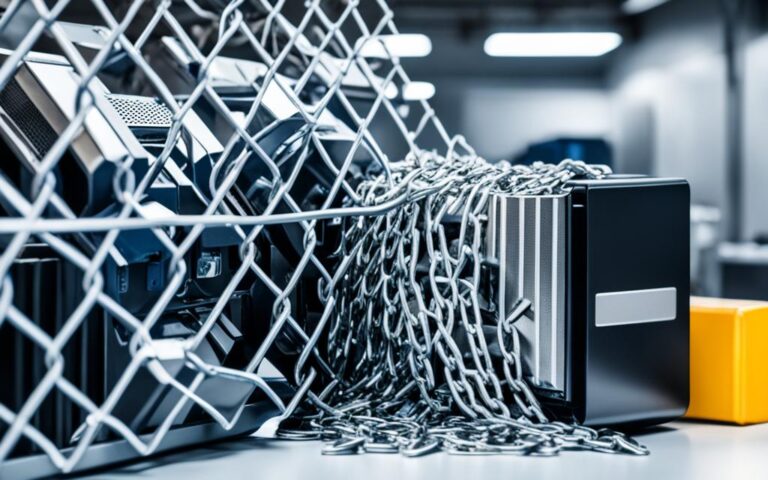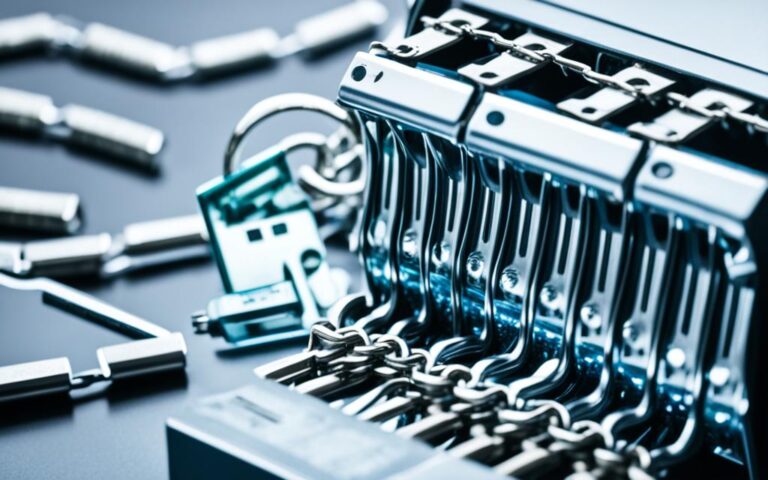Data Destruction: Ensuring the Confidentiality of Corporate Communications
In today’s digital age, maintaining the confidentiality of corporate communications is of paramount importance. Protecting sensitive information from unauthorized access and accidental loss is crucial for businesses to comply with data protection laws and prevent reputational damage. One effective way to safeguard corporate confidentiality is through data destruction. By securely disposing of confidential waste, businesses can minimize the risk of data leaks and maintain the trust of their stakeholders.
Data destruction involves the secure handling and destruction of confidential information to prevent its misuse. This process is essential for businesses as it helps them comply with the Data Protection Act, which mandates the proper handling and protection of personal data. Compliance with the Data Protection Act is crucial to avoid the hefty fines and legal consequences associated with data breaches.
Implementing data destruction practices requires businesses to partner with suppliers who comply with industry standards. European Standard BS EN 15713:2009 provides guidelines for security shredding, ensuring that confidential waste is irreversibly destroyed. Additionally, BS 7858 sets standards for staff vetting, ensuring that only trusted personnel handle sensitive information.
By prioritizing data destruction and partnering with reliable suppliers, businesses can effectively protect their corporate communications confidentiality. This not only helps maintain compliance with data protection laws but also prevents the risks associated with information leakage. It enables businesses to build strong relationships based on trust and professionalism with their customers, partners, and stakeholders.
Importance of Secure Data Destruction in Public Sector Organizations
Public sector organizations have a greater responsibility to protect sensitive data due to the potential impact on organizational reputation and public trust. The consequences of breaching the Data Protection Act can be severe, including heavy fines and reputational damage. Several public sector organizations have faced significant fines for failing to adequately protect confidential information.
One notable case involved the NHS Trust, which was fined £200,000 for its failure to ensure the proper disposal of patient records. Such incidents highlight the critical importance of secure data destruction in public sector organizations. A survey conducted by the British Security Industry Association (BSIA) revealed that a significant number of data loss incidents in the healthcare sector were a result of incorrect disposal.
Ensuring compliance with the Data Protection Act is vital for public sector organizations. Meeting the requirements of the act requires organizations to adopt secure data destruction practices. European Standard BS EN 15713:2009 provides recommendations for the secure collection, transportation, and destruction of confidential material. By adhering to these standards, organizations can prevent data breaches, maintain confidentiality, and protect sensitive information.
The Impact of Data Breaches in Public Sector Organizations
“The consequences of data breaches in public sector organizations can be devastating. They not only result in financial penalties but also erode public trust and confidence. It is essential for these organizations to prioritize secure data destruction to safeguard sensitive information and maintain their reputation.”
Implementing secure data destruction practices is crucial for public sector organizations to safeguard their stakeholders’ trust and prevent potential legal and financial risks. By ensuring the proper disposal of confidential information, these organizations demonstrate their commitment to professionalism, integrity, and data privacy.
Data Protection Act Compliance and Secure Data Destruction
To meet the requirements of the Data Protection Act, public sector organizations must prioritize secure data destruction. Compliance with European Standard BS EN 15713:2009 is essential in ensuring the secure collection, transportation, and destruction of confidential material.
By following these guidelines, organizations can minimize the risk of data breaches, protect sensitive information, and avoid the consequences of non-compliance. Secure data destruction is not only a legal obligation but also a fundamental practice to maintain confidentiality and trust within public sector organizations.
Best Practices for Maintaining Confidentiality in Administrative Roles
Maintaining confidentiality and data security is crucial for administrative professionals who handle sensitive information. As custodians of classified data, they must understand the importance of confidentiality and the legal and ethical obligations related to data protection.
Here are some best practices to ensure confidentiality and data security in administrative roles:
- Limited Access: Access to confidential information should be limited to authorized personnel only. Implement secure login credentials and multi-factor authentication to prevent unauthorized access.
- Document and File Protection: Utilize proper measures to protect physical and digital documents. Use locked filing cabinets and restricted access areas for physical files. Secure digital files with password protection and encryption.
- Employee Training: Train employees on confidentiality policies and best practices. Emphasize the importance of data security and refresh training regularly to keep employees updated on evolving threats and best practices.
- Secure Communication Channels: Utilize secure communication channels, such as encrypted emails and internal messaging systems, to transmit sensitive information. Discourage the use of personal email or unsecured communication platforms.
- Vulnerability Management: Regularly update software and apply patches to protect against vulnerabilities. Implement a robust system for identifying and mitigating potential risks that may compromise data security.
By following these best practices, administrative professionals can play a vital role in maintaining confidentiality and upholding data security within their organizations.
“Administrative professionals are entrusted with sensitive information, and it is their responsibility to uphold confidentiality and data security. By implementing best practices, they contribute to the overall protection of organizational data and prevent potential breaches.”
— Jane Smith, Chief Information Security Officer
| Benefits of Best Practices for Maintaining Confidentiality in Administrative Roles | Impact |
|---|---|
| Reduced Risk of Data Breaches | Minimizes the chances of unauthorized access and leakage of sensitive information. |
| Compliance with Data Protection Regulations | Ensures adherence to legal requirements and avoids potential penalties. |
| Enhanced Trust and Reputation | Builds confidence among stakeholders by demonstrating a commitment to safeguarding confidential data. |
| Stronger Data Security Culture | Promotes a culture of data security awareness and responsibility among administrative staff. |
The Business Priority of Data Destruction
Data destruction is a top priority for businesses due to several reasons. Firstly, it helps prevent information leakage, which can damage the organization’s reputation and result in financial losses. Secondly, it ensures the maintenance of confidentiality and trustworthiness, which are essential for building strong relationships with customers and partners. Thirdly, data destruction is necessary to comply with the law and maintain data integrity. Fourthly, it helps prevent business risks associated with data leaks. Lastly, data destruction coordinates with the law, reducing potential legal risks. By implementing proper data destruction practices, businesses can protect their sensitive information and demonstrate their commitment to professionalism and integrity.
Businesses today operate in a highly interconnected and data-driven environment. The accumulation of sensitive data poses a significant risk if not properly managed. Without appropriate measures in place, data can be exposed to unauthorized access, leading to severe consequences. That’s why data destruction is essential for businesses of all sizes.
“Data destruction is not just about eliminating data, but about eliminating the risks that come with it.”
The Consequences of Information Leakage
Information leakage can have devastating consequences for businesses. It can result in reputational damage, loss of customer trust, and financial implications. A data breach can lead to legal actions, fines, regulatory investigations, and potential lawsuits. Not to mention the potential damage to customer relationships and the resulting loss of business.
By prioritizing data destruction, businesses can prevent these risks and safeguard their reputation. It provides the assurance that sensitive information is securely disposed of and cannot be accessed by unauthorized individuals.
The Importance of Confidentiality and Trustworthiness
Confidentiality and trustworthiness are fundamental values for businesses. They are crucial for establishing and maintaining strong relationships with customers and partners. Customers expect their information to be handled with care and confidentiality, and any breach of trust can have long-lasting negative effects.
Implementing proper data destruction practices demonstrates a commitment to maintaining confidentiality and trust. It assures customers and partners that their sensitive information is handled responsibly and destroyed securely when no longer needed.
Compliance with Data Protection Laws
Data protection laws require businesses to take appropriate measures to safeguard sensitive information. Failure to comply can have serious consequences. Data destruction is a crucial aspect of compliance with data protection laws, ensuring that personal data is securely disposed of in accordance with legal requirements.
For example, the General Data Protection Regulation (GDPR) in the European Union sets stringent standards for data protection. It mandates the secure and permanent disposal of personal data, further highlighting the importance of data destruction in maintaining compliance with the law.
Preventing Business Risks
Data leaks can expose businesses to a range of risks. These risks include financial losses, reputational damage, legal actions, and operational disruptions. By prioritizing data destruction, businesses can prevent these risks and protect their overall business continuity.
Proper data destruction reduces the potential for data leaks and unauthorized access, ensuring the confidentiality and integrity of sensitive information. It helps businesses avoid the negative consequences of data breaches and minimizes their exposure to legal and financial risks.
The Significance of Data Destruction in Preserving Confidentiality
Data destruction plays a crucial role in preserving the confidentiality of business and customer information. By securely and permanently destroying unnecessary data, businesses can prevent the risk of data leaks and maintain the trust of their customers and partners. It is essential to prioritize data destruction as part of a comprehensive data protection strategy to prevent potential risks and breaches.
Preserving confidentiality is of utmost importance in today’s digital landscape, where data breaches and cyber threats are prevalent. Businesses must take proactive steps to prevent unauthorized access to sensitive information, ensuring that confidential data remains secure throughout its lifecycle.
Coordination with the law is vital in maintaining data integrity and protecting sensitive information. By understanding and following relevant data protection regulations, businesses can ensure compliance and reduce the potential legal risks associated with data breaches. Adhering to industry standards and guidelines for data destruction, such as the European Standard BS EN 15713:2009, further enhances data security and confidentiality.
By implementing robust data destruction practices, businesses can effectively safeguard their confidentiality and prevent potential risks. Not only does data destruction prevent unauthorized access and information leakage, but it also demonstrates a commitment to professionalism, integrity, and data privacy.
Furthermore, data destruction helps businesses comply with data protection laws, ensuring that personal and sensitive information is handled appropriately and in accordance with legal requirements. This proactive approach to data protection can help businesses avoid potential legal consequences, fines, and reputational damage.
To summarize, prioritizing data destruction is crucial for preserving confidentiality, preventing risks, and coordinating with the law. By securely disposing of unnecessary data and following industry best practices, businesses can maintain the trust of their stakeholders and protect sensitive information from unauthorized access.
It is important for businesses to regularly assess and update their data destruction practices to ensure they remain effective and aligned with evolving data protection regulations.
Benefits of Data Destruction in Preserving Confidentiality:
- Prevents data leaks and unauthorized access to sensitive information.
- Maintains the trust of customers and partners.
- Ensures compliance with data protection laws and regulations.
- Reduces potential legal and business risks associated with data breaches.
- Safeguards confidentiality and protects sensitive information.
| Benefits | Description |
|---|---|
| Prevents data leaks | Secure and permanent destruction of unnecessary data eliminates the risk of data leaks, protecting confidentiality. |
| Maintains trust | By prioritizing data destruction, businesses maintain the trust of customers and partners by safeguarding their sensitive information. |
| Ensures compliance | Data destruction ensures compliance with data protection laws and regulations, reducing the risk of legal consequences. |
| Reduces risks | By preventing data breaches and unauthorized access, data destruction helps businesses mitigate potential legal and business risks. |
| Safeguards confidentiality | Proper data destruction practices protect sensitive information from falling into the wrong hands, ensuring confidentiality. |
The Role of Data Destruction in Preventing Information Leakage
Data destruction plays a crucial role in preventing information leakage and safeguarding sensitive data. By implementing effective data destruction practices, organizations can mitigate the risk of unauthorized access and maintain the confidentiality of their valuable information.
Confidentiality Policy:
Creating a clear and comprehensive confidentiality policy is vital for organizations to ensure the protection of all types of data they maintain. This policy should outline guidelines and procedures for handling confidential information, including the secure disposal of unnecessary data. By establishing a confidentiality policy, organizations can set clear expectations for employees and promote a culture of data privacy.
Employee Training:
Proper training on confidentiality policies is essential to ensure that employees understand and comply with established procedures. Training sessions should cover topics such as data classification, secure data handling, and the importance of data destruction. By providing employees with the necessary knowledge and skills, organizations can empower them to actively contribute to preventing information leakage.
Anti-Leakage Technology:
The use of anti-leakage technology is crucial in protecting stored data and preventing unauthorized access. Encryption, malware detection systems, and firewalls can create multiple layers of defense to safeguard sensitive information. By harnessing the power of advanced cybersecurity tools, organizations can bolster their data protection measures and enhance their overall security posture.
Data Access Management:
Implementing proper data access management practices is essential for reducing the risk of information leakage. Organizations should establish access controls and user permissions to limit data access to authorized personnel only. Regular reviews and audits of user privileges should also be conducted to ensure that access permissions align with job roles and responsibilities. By effectively managing data access, organizations can prevent unauthorized individuals from obtaining sensitive information.
Regular Data Destruction:
Regularly destroying unnecessary data is a critical practice to minimize the chances of information leakage. By securely disposing of obsolete or redundant data, organizations reduce the risk of data breaches and ensure that confidential information remains protected. Scheduled data destruction routines should be established to systematically remove data that is no longer required. Proper shredding techniques or secure data destruction services should be employed to render the data irretrievable.
By adopting a comprehensive approach to data destruction, organizations can significantly reduce the risk of information leakage and uphold the confidentiality of their sensitive data.
Conclusion
Maintaining the confidentiality of corporate communications is of paramount importance in today’s digital age. By prioritizing data destruction and implementing best practices, businesses can ensure the protection of sensitive information and compliance with data protection laws.
Public sector organizations must understand the specific requirements and standards, such as EN 15713 BS EN 15713:2009 and BS 7858, to securely handle confidential waste. By maintaining confidentiality, businesses can build trust with their stakeholders and mitigate the risks associated with information leakage. Prioritizing data destruction demonstrates a commitment to professionalism, integrity, and data privacy.
By safely destroying unnecessary data, businesses prevent information leakage, protect their reputation, and avoid financial losses. Compliance with data protection laws is crucial for maintaining data integrity and ensuring the confidentiality of sensitive information. Prioritizing data destruction not only safeguards corporate communications but also helps establish a trustworthy and secure environment for customers and partners.
FAQ
What is the importance of data destruction for maintaining the confidentiality of corporate communications?
Data destruction is crucial for maintaining the confidentiality of corporate communications. It helps prevent information leakage, which can damage the organization’s reputation and result in financial losses. Additionally, data destruction ensures compliance with data protection laws and helps prevent potential legal and business risks.
Why is secure data destruction important for public sector organizations?
Public sector organizations have a greater responsibility to protect sensitive data due to the potential impact on organizational reputation and public trust. Numerous public sector organizations have been fined for breaches of the Data Protection Act. Secure data destruction is essential to prevent data leaks and comply with the Data Protection Act.
What are the best practices for maintaining confidentiality in administrative roles?
Administrative professionals who handle sensitive information should understand the importance of confidentiality and the legal and ethical obligations related to data protection. Access to confidential information should be limited to authorized personnel only, with secure login credentials and multi-factor authentication. Proper document and file protection measures, both physical and digital, should be in place.
Why is data destruction a top priority for businesses?
Data destruction is a top priority for businesses due to several reasons. It helps prevent information leakage, which can damage the organization’s reputation and result in financial losses. It ensures the maintenance of confidentiality and trustworthiness, essential for building strong relationships with customers and partners. Data destruction is necessary to comply with data protection laws and maintain data integrity. It also helps prevent business risks associated with data leaks, as well as potential legal risks.
What is the significance of data destruction in preserving confidentiality?
By securely and permanently destroying unnecessary data, businesses can prevent the risk of data leaks and maintain the trust of their customers and partners. Data destruction also ensures compliance with data protection laws and helps prevent potential legal and business risks. Coordinating with the law by understanding and following relevant regulations is essential for maintaining data integrity and protecting sensitive information.
What is the role of data destruction in preventing information leakage?
Data destruction plays a crucial role in preventing information leakage. Organizations should create a clear confidentiality policy that addresses the protection of all types of data they maintain. Employee training on confidentiality policies is essential to ensure understanding and compliance. The use of anti-leakage technology, such as encryption, malware detection, and firewalls, helps protect stored data and prevent unauthorized access. Implementing proper data access management and regular destruction of unnecessary data further reduces the risk of information leakage.













